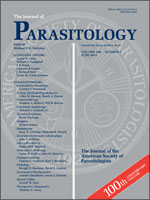The identification of excreted–secreted (ES) proteins of filarial nematodes as potential diagnostic reagents is an important requirement for the development of methods to determine level of infection in the host, especially for human filariae. Dirofilaria immitis, the canine heartworm, is a widespread and important veterinary pathogen and is a useful model for filarial parasites of humans. An analysis of proteins released from adult D. immitis (the secretome) in culture is available. We sought to identify D. immitis ES proteins found in vivo to validate the in vitro secretome and to investigate them as potential diagnostic reagents. Cultures of D. immitis adults obtained from infected dogs were maintained for 72 hr with daily changes of media. Proteins were concentrated from spent media by standard methods and were passed through Protein-A columns containing purified IgG antibodies from heartworm-infected dogs. Following extensive washing, heartworm proteins recognized by the antibodies were eluted from these columns and submitted for analysis by tandem mass spectrometry (MS/MS). As a comparison, somatic proteins from adult D. immitis female parasites and microfilaria were also processed and analyzed by the same protocol. Six, 9, and 12 proteins were identified by MS/MS in the ES, adult female, and microfilaria samples, respectively. The identification of the most abundant parasite proteins present in the serum of infected hosts offers a rational approach to the development of new diagnostic assays that may be applicable across the Filarioidea.
How to translate text using browser tools
1 June 2014
Identification of Dirofilaria immitis Proteins Recognized by Antibodies from Infected Dogs
A. J. Sassi,
J. F. Geary,
L. P. Leroux,
A. R. Moorhead,
M. Satti,
C. D. Mackenzie,
T. G. Geary
ACCESS THE FULL ARTICLE

Journal of Parasitology
Vol. 100 • No. 3
June 2014
Vol. 100 • No. 3
June 2014




